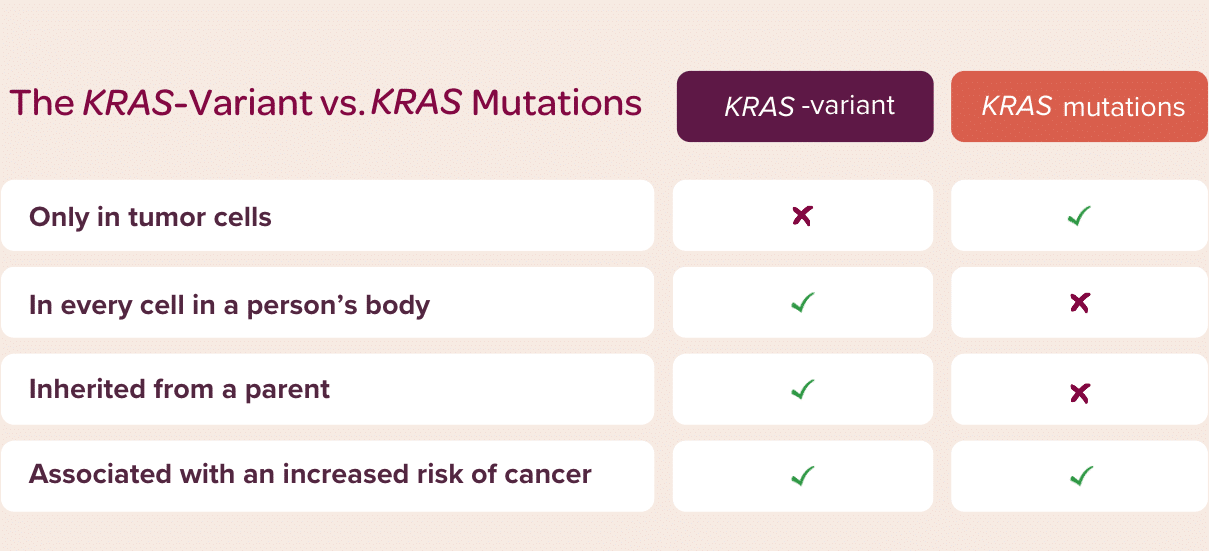Learn more about how our genes play a role in cancer development in this two-part series comparing different genetic variants and genetic mutations.
For Part 1, we’ll discuss the KRAS-variant and KRAS mutations.
Genes and cancer development: Gene Variants vs Mutations
Cancer is caused by genetic differences in the DNA you are born with, by genetic changes to our DNA that happen over your lifetime, or a combination of both. Understanding the distinction between a gene variant and a mutation is crucial in genetics.
Genetic variants are inherited.
Genetic variants are always inherited from a parent. Any genetic variant you have is present in every cell of your body. Pathogenic variants are genetic variants that can lead to disease, like cancer. While these variants are sometimes called mutations, the correct term is pathogenic variant. For families with strong histories of cancer, a pathogenic variant is often the explanation since they can be passed down from generation to generation.
Genetic mutations are genetic changes that happen during life.
Mutations are constantly happening in the DNA in your body’s cells. A mutation may be harmful or not, but typically, the body corrects these mutations. When it doesn’t, those genetic mutations can lead to cancer. The mutation always starts in one cell and can multiply, causing the cancer to grow.
What is KRAS?
KRAS is a gene in your DNA that helps control how a cell grows. It has been known for several decades that mutations in KRAS can lead to cancer.
What is the difference between the KRAS-variant and KRAS mutations?
While the KRAS-variant and KRAS mutations both affect the KRAS gene, they are quite different.
The KRAS-variant is something a person is born with and it is in all of their cells. You either have this variant, or you do not, and you can be tested for it in a DNA sample from your saliva or a cheek swab. The KRAS-variant is one example of a pathogenic variant.
In contrast, KRAS mutations are caused by damage to DNA that happens during a person’s lifetime in the KRAS gene. KRAS mutations are most often found in certain cancer types, including pancreatic cancer, lung cancer and colon cancer. These mutations are only found in the cells of a tumor.

Knowing what genetic variants or mutations you carry can be valuable tools for your health.
If you do not have cancer, but are concerned about a risk of cancer, you can have genetic testing to look for pathogenic variants, like the KRAS-variant. Knowing your KRAS-variant status could provide valuable knowledge not only about your cancer risk, but also possible strategies for cancer prevention. For example, our studies have shown women with the KRAS-variant can reduce their cancer risk by maintaining their estrogen levels throughout menopause and beyond.
If you have cancer, your doctor may test your tumor for gene mutations, like KRAS mutations, to help determine treatment.
To recap, genetic variants are differences in your DNA that you are born with, while genetic mutations are changes that happen to DNA during your lifetime — both can cause cancer.
Check out Part 2 of this series comparing the BRCA variants and the KRAS-variant.




Leave a Reply